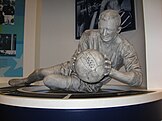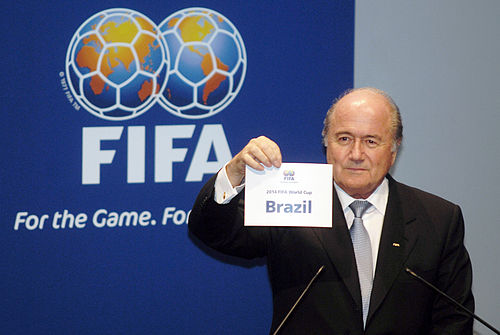
Back بوابة:كرة القدم Arabic بوابة:كرة القدم ARZ Portal:Futbol Azerbaijani Партал:Футбол Byelorussian Партал:Футбол BE-X-OLD Портал:Футбол Bulgarian প্রবেশদ্বার:ফুটবল Bengali/Bangla Portal:Nogomet BS Portal:Futbol Catalan دەروازە:تۆپی پێ CKB
| Main page | Categories & Topics | WikiProjects & Things you can do |
The Association football portal
Association football, more commonly known as football or soccer, is a team sport played between two teams of 11 players each, who primarily use their feet to propel a ball around a rectangular field called a pitch. The objective of the game is to score more goals than the opposing team by moving the ball beyond the goal line into a rectangular-framed goal defended by the opposing team. Traditionally, the game has been played over two 45-minute halves, for a total match time of 90 minutes. With an estimated 250 million players active in over 200 countries and territories, it is the world's most popular sport.
The game of association football is played in accordance with the Laws of the Game, a set of rules that has been in effect since 1863 and maintained by the IFAB since 1886. The game is played with a football that is 68–70 cm (27–28 in) in circumference. The two teams compete to get the ball into the other team's goal (between the posts, under the bar, and across the goal line), thereby scoring a goal. When the ball is in play, the players mainly use their feet, but may use any other part of their body, except for their hands or arms, to control, strike, or pass the ball. Only the goalkeepers may use their hands and arms, and only then within the penalty area. The team that has scored more goals at the end of the game is the winner. There are situations where a goal can be disallowed, such as an offside call or a foul in the build-up to the goal. Depending on the format of the competition, an equal number of goals scored may result in a draw being declared, or the game goes into extra time or a penalty shoot-out.
Internationally, association football is governed by FIFA. Under FIFA, there are six continental confederations: AFC, CAF, CONCACAF, CONMEBOL, OFC, and UEFA. Of these confederations, CONMEBOL is the oldest one, being founded in 1916. National associations (e.g. The FA or JFA) are responsible for managing the game in their own countries both professionally and at an amateur level, and coordinating competitions in accordance with the Laws of the Game. The most senior and prestigious international competitions are the FIFA World Cup and the FIFA Women's World Cup. The men's World Cup is the most-viewed sporting event in the world, surpassing the Olympic Games. The two most prestigious competitions in European club football are the UEFA Champions League and the UEFA Women's Champions League, which attract an extensive television audience throughout the world. Since 2009, the final of the men's tournament has been the most-watched annual sporting event in the world. (Full article...)
Selected article
Juventus is the most successful team in the history of Italian football. Overall, the club have won 51 official trophies, more than any other Italian team; 40 in Italy, which is also a record, and 11 in European and world competitions. As of 2007, Juventus is the third most successful club in Europe and the sixth in the world with the most international titles recognized by UEFA and FIFA
Juventus' greatest rivals are the Milanese side Inter Milan with whom they compete the Derby d'Italia. The team is also one of the G-14’s founding members, a group that represents eighteen of the largest and most prestigious European football clubs. (Full article...)
Selected biography
Named FWA Footballer of the Year for 1956, Trautmann entered football folklore with his performance in the 1956 FA (Football Association) Cup Final. With 15 minutes of the match remaining Trautmann suffered a serious injury after diving at the feet of Birmingham City's Peter Murphy. Despite his injury he continued to play, making crucial saves to preserve his team's 3–1 lead. His neck was noticeably crooked as he collected his winners' medal; three days later an X-ray revealed it to be broken.
Trautmann continued to play for Manchester City until 1964, making 545 appearances. In 2004 he was appointed an honorary Officer of the Order of the British Empire (OBE) for promoting Anglo-German understanding through football. (Full article...)
Selected association

The German Football Association (German: Deutscher Fußball-Bund [ˈdɔʏtʃɐ ˈfuːsbalˌbʊnt]; DFB [ˌdeːʔɛfˈbeː] ) is the governing body of football, futsal, and beach soccer in Germany. A founding member of both FIFA and UEFA, the DFB has jurisdiction for the German football league system and is in charge of the men's and women's national teams. The DFB headquarters are in Frankfurt am Main. Sole members of the DFB are the German Football League (German: Deutsche Fußball Liga; DFL), organising the professional Bundesliga and the 2. Bundesliga, along with five regional and 21 state associations, organising the semi-professional and amateur levels. The 21 state associations of the DFB have a combined number of more than 25,000 clubs with more than 6.8 million members, making the DFB the single largest sports federation in the world. (Full article...)
Did you know (auto-generated) -

- ... that Carlton Town F.C., now competing at the eighth tier of the English football pyramid, was once denied promotion by a hat-trick scored by future England international Jamie Vardy?
- ... that Ecuadorian footballer Hernán Galíndez won a bicycle for beating a team featuring Lionel Messi when they were children?
- ... that goalkeeper Sophie Whitehouse, who has lived in England, Africa and the US, has been chosen to play soccer for the Republic of Ireland?
- ... that Welsh footballer Jon Morgan went on to become a college principal after retiring?
- ... that Ryan Roberts, a defensive end for Notre Dame, was a soccer player in high school?
- ... that after his soccer career, Steve Palacios enlisted in the United States Army and played for the United States Armed Forces soccer team?
Selected image
Selected quote
General images -
Selected World Cup
The 2006 FIFA World Cup was the 18th FIFA World Cup, the quadrennial international football world championship tournament. It was held from 9 June to 9 July 2006 in Germany, which had won the right to host the event in July 2000. Teams representing 198 national football associations from all six populated continents participated in the qualification process which began in September 2003. Thirty-one teams qualified from this process along with hosts Germany for the finals tournament. It was the second time that Germany staged the competition and the first as a unified country along with the former East Germany with Leipzig as a host city (the other was in 1974 in West Germany), and the 10th time that the tournament was held in Europe.
Italy won the tournament, claiming their fourth World Cup title, defeating France 5–3 in a penalty shoot-out in the final after extra time had finished in a 1–1 draw. Germany defeated Portugal 3–1 to finish in third place. Angola, Ukraine, Ghana, the Ivory Coast, Trinidad and Tobago and Togo made their first appearances in the finals. It was also the only appearance of Serbia and Montenegro under that name; they had previously appeared in 1998 as Yugoslavia. In late May 2006, immediately prior to the tournament, Montenegro voted in a referendum to become an independent nation and dissolve the loose confederacy then existing between it and Serbia; Serbia recognised the results of the referendum in early June. Due to time constraints, FIFA had Serbia and Montenegro play in the World Cup tournament as one team, marking the first instance of multiple sovereign nations competing as one team in a major football tournament since UEFA Euro 1992. (Full article...)Selected topic
More did you know -
- ... that Crewe Alexandra were promoted back to the second tier of English football for the first time in 101 years when they won the 1997 Football League Second Division play-off Final? (27 March 2021)
- ... that Bradford City scored three goals in 13 minutes to secure promotion in the 2013 Football League Two play-off Final? (21 February 2021)
- ... that MLS Cup 1999 was played with new rule changes that were approved days before the game? (28 March 2021)
- ... that Cheltenham Town lost the 2012 Football League Two play-off Final, their first defeat in nine play-off matches? (6 March 2021)
- ... that Manjappada, a supporters' group of Kerala Blasters FC, coordinated and brought forty-one busloads of their fans across Kerala to the venue for the opening match of the 2019–20 season? (26 January 2021)
- ... that after winning the 2004 Football League Second Division play-off Final, some of the Brighton & Hove Albion players dropped the trophy while celebrating and damaged it? (2 March 2021)
Association football portals
More sports portals
Associated Wikimedia
The following Wikimedia Foundation sister projects provide more on this subject:
-
Commons
Free media repository -
Wikibooks
Free textbooks and manuals -
Wikidata
Free knowledge base -
Wikinews
Free-content news -
Wikiquote
Collection of quotations -
Wikisource
Free-content library -
Wikiversity
Free learning tools -
Wiktionary
Dictionary and thesaurus












































